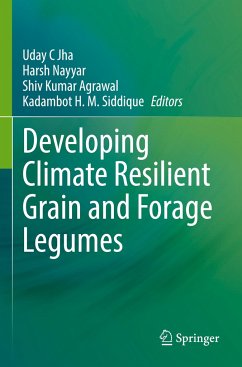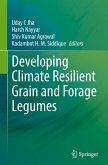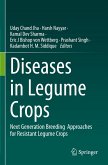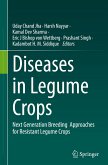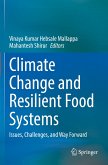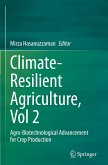Developing Climate Resilient Grain and Forage Legumes
Herausgegeben:Jha, Uday C; Nayyar, Harsh; Agrawal, Shiv Kumar; Siddique, Kadambot H. M.
Developing Climate Resilient Grain and Forage Legumes
Herausgegeben:Jha, Uday C; Nayyar, Harsh; Agrawal, Shiv Kumar; Siddique, Kadambot H. M.
- Broschiertes Buch
- Merkliste
- Auf die Merkliste
- Bewerten Bewerten
- Teilen
- Produkt teilen
- Produkterinnerung
- Produkterinnerung
This edited book covers all aspects of grain legumes including negative impact of abiotic and biotic stresses under the changing global climate. It discusses the role of various subject disciplines ranging from plant breeding, genetics, plant physiology, molecular biology, and genomics to high-throughput phenotyping and other emerging technologies for sustaining global grain and fodder legume production to alleviate impending global food crises. The book offers strategies to ensure plant-based dietary protein security across the globe. It covers all major commercial legume crops used as food,…mehr
Andere Kunden interessierten sich auch für
![Developing Climate Resilient Grain and Forage Legumes Developing Climate Resilient Grain and Forage Legumes]() Developing Climate Resilient Grain and Forage Legumes134,99 €
Developing Climate Resilient Grain and Forage Legumes134,99 €![Diseases in Legume Crops Diseases in Legume Crops]() Diseases in Legume Crops149,99 €
Diseases in Legume Crops149,99 €![Diseases in Legume Crops Diseases in Legume Crops]() Diseases in Legume Crops149,99 €
Diseases in Legume Crops149,99 €![Climate Change and Resilient Food Systems Climate Change and Resilient Food Systems]() Climate Change and Resilient Food Systems171,99 €
Climate Change and Resilient Food Systems171,99 €![Climate Change and Resilient Food Systems Climate Change and Resilient Food Systems]() Climate Change and Resilient Food Systems123,99 €
Climate Change and Resilient Food Systems123,99 €![Climate-Resilient Agriculture, Vol 2 Climate-Resilient Agriculture, Vol 2]() Climate-Resilient Agriculture, Vol 2140,99 €
Climate-Resilient Agriculture, Vol 2140,99 €![Climate-Resilient Agriculture, Vol 2 Climate-Resilient Agriculture, Vol 2]() Climate-Resilient Agriculture, Vol 2134,99 €
Climate-Resilient Agriculture, Vol 2134,99 €-
-
-
This edited book covers all aspects of grain legumes including negative impact of abiotic and biotic stresses under the changing global climate. It discusses the role of various subject disciplines ranging from plant breeding, genetics, plant physiology, molecular biology, and genomics to high-throughput phenotyping and other emerging technologies for sustaining global grain and fodder legume production to alleviate impending global food crises. The book offers strategies to ensure plant-based dietary protein security across the globe. It covers all major commercial legume crops used as food, feed and fodder. This book is targeted to graduate and postgraduate students, researchers, progressive farmers and policymakers to inform them of the importance of cultivating grain and fodder legumes for future global food and nutritional security and for maintaining sustainable ecosystem.
Produktdetails
- Produktdetails
- Verlag: Springer / Springer Nature Singapore / Springer, Berlin
- Artikelnr. des Verlages: 978-981-16-9850-7
- 1st edition 2022
- Seitenzahl: 336
- Erscheinungstermin: 28. Mai 2023
- Englisch
- Abmessung: 235mm x 155mm x 19mm
- Gewicht: 511g
- ISBN-13: 9789811698507
- ISBN-10: 9811698503
- Artikelnr.: 67863021
- Herstellerkennzeichnung Die Herstellerinformationen sind derzeit nicht verfügbar.
- Verlag: Springer / Springer Nature Singapore / Springer, Berlin
- Artikelnr. des Verlages: 978-981-16-9850-7
- 1st edition 2022
- Seitenzahl: 336
- Erscheinungstermin: 28. Mai 2023
- Englisch
- Abmessung: 235mm x 155mm x 19mm
- Gewicht: 511g
- ISBN-13: 9789811698507
- ISBN-10: 9811698503
- Artikelnr.: 67863021
- Herstellerkennzeichnung Die Herstellerinformationen sind derzeit nicht verfügbar.
Dr. Uday C Jha graduated from Visva-Bharati University, Santiniketan, India. He is working in the area of grain legume breeding, genetics, and genomics for abiotic stress tolerance since 2010 at the Indian Institute of Pulses Research, Kanpur, ICAR, India. He has more than 32 peered-reviewed international publications and 1 edited book. He has attended and delivered oral and poster presentation in various national and international conferences. He is associated in developing six chickpea varieties. Dr. Jha was awarded with ISPRD fellowship in 2016 by the Indian Society of Pulses & Research Development (ISPRD) and Young Scientist Award by IJBSM society in 2017 at Jaipur India. He has also received the Chickpea Team Award in 2020 from IIPR, Kanpur. He is serving as editorial board member of the journal BMC Plant Biology. Professor Harsh Nayyar is currently a professor in the Department of Botany, Panjab University, Chandigarh. He graduated from Punjab Agricultural University, India, and worked at the Indian Council of Agricultural Research and H.P. Agricultural University, Palampur, India, prior to his present position. His research program aims to study the responses of various food legumes such as chickpea, lentil, mungbean, and urdbean to abiotic stresses like heat, drought, and cold as well as their combination. He is developing convenient and easy screening methods to identify stress-tolerant legumes and also investigating the mechanisms at various organizational levels underlying stress tolerance. He has published about 140 research papers in peer-reviewed high impact factor research journals. Dr Shiv Kumar holds a Ph.D. in plant breeding from the GB Pant University of Agriculture and Technology, Pantnagar, India. His area of expertise includes crop improvement through resistance breeding, widening the genetic base through pre-breeding, and development of genetic and genomic resources in food legumes. Duringthe 30 years of his professional career, he, in collaboration with national partners, has contributed to the development of 59 lentil, 5 mung bean, 2 urdbean, 1 rice, and 3 grass pea varieties and published 196 peer-reviewed journal articles, 72 book chapters, 9 books, 7 technical bulletins, and 2 training manuals. He is a fellow of professional societies including the International Legumes Society, the Indian Society of Genetics and Plant Breeding, and the Indian Society of Pulses Research and Development. Professor Dr. Kadambot Siddique is the Hackett Professor of Agriculture Chair and Director of The UWA Institute of Agriculture, The University of Western Australia. He has a national and international reputation in agricultural science, especially in the fields of crop physiology, production agronomy, farming systems, genetic resources, breeding research in cereal, grain and pasture legumes, and oilseed crops. He has publishedmore than 580 scientific papers and book chapters and books. Professor Siddique is a highly cited researcher (Hi Ci) in agricultural science and plant and animal science (Thomson Reuters/ Clarivate Analytics).He is a fellow of the Australian Academy of Technological Sciences and Engineering (FTSE), the Australian Agricultural Institute, and the Indian National Academy of Agricultural Sciences (FNAAS). Prof. Siddique is a fellow of the African Academy of Sciences (FAAS) (first Australia to be elected to the Academy). He is also a fellow of the Indian Society of Plant Physiology.
Chapter 1. Improving chickpea genetic gain under rising drought and heat stress using breeding approaches and modern technologies.- Chapter 2. Breeding chickpea for climate resilience: An overview.- Chapter 3. Reduction of Phytic Acid and Enhancement of Bioavailable Micronutrients in Common Beans (Phaseolus vulgaris L.) in Changing Climatic Scenario.- Chapter 4. Developing climate resilient Cowpea (Vigna unguiculata [L].Walp) through genomics-assisted breeding approaches.- Chapter 5. Fenugreek, a legume spice and multi-use crop adapted to a changing climate.- Chapter 6. Grass pea an inherent abiotic stress tolerant legume: Current status and future scope under changing environment.- Chapter 7. Breeding groundnut cultivars for resilience to climate change effects.- Chapter 8. Horse gram, an underutilized climate-resilient legume: Breeding and genomic approach for improving future genetic gain.-Chapter 9. Understanding abiotic stress responses in lentil under changing climate regimes.- Chapter 10. Approaches towards developing heat and drought tolerance in Mungbean.- Chapter 11. A Review on Stress Physiology and Breeding Potential of an underutilized, multipurpose legume: Rice Bean (Vigna umbellata).- Chapter 12. Physiological Traits Based Breeding to Achieve Higher Yield in soybean Crop.- Chapter 13. Sunnhemp-A Climate Smart Crop.
Chapter 1. Improving chickpea genetic gain under rising drought and heat stress using breeding approaches and modern technologies.- Chapter 2. Breeding chickpea for climate resilience: An overview.- Chapter 3. Reduction of Phytic Acid and Enhancement of Bioavailable Micronutrients in Common Beans (Phaseolus vulgaris L.) in Changing Climatic Scenario.- Chapter 4. Developing climate resilient Cowpea (Vigna unguiculata [L].Walp) through genomics-assisted breeding approaches.- Chapter 5. Fenugreek, a legume spice and multi-use crop adapted to a changing climate.- Chapter 6. Grass pea an inherent abiotic stress tolerant legume: Current status and future scope under changing environment.- Chapter 7. Breeding groundnut cultivars for resilience to climate change effects.- Chapter 8. Horse gram, an underutilized climate-resilient legume: Breeding and genomic approach for improving future genetic gain.-Chapter 9. Understanding abiotic stress responses in lentil under changing climate regimes.- Chapter 10. Approaches towards developing heat and drought tolerance in Mungbean.- Chapter 11. A Review on Stress Physiology and Breeding Potential of an underutilized, multipurpose legume: Rice Bean (Vigna umbellata).- Chapter 12. Physiological Traits Based Breeding to Achieve Higher Yield in soybean Crop.- Chapter 13. Sunnhemp-A Climate Smart Crop.

